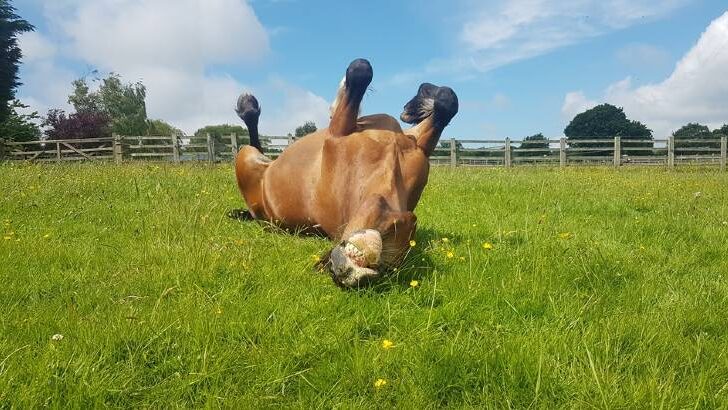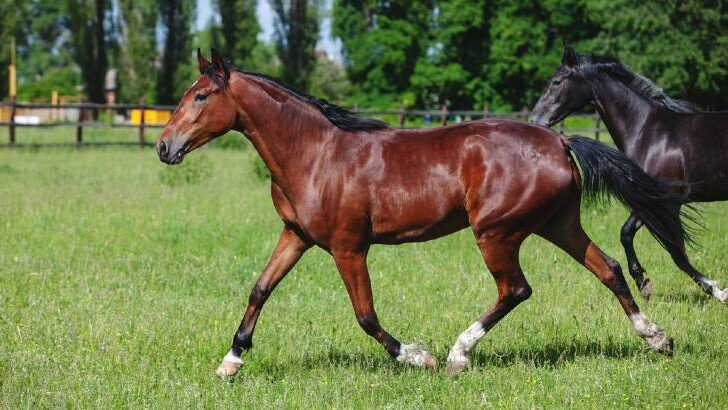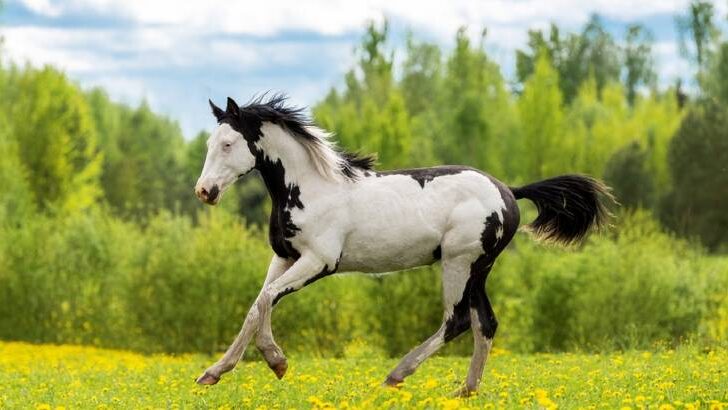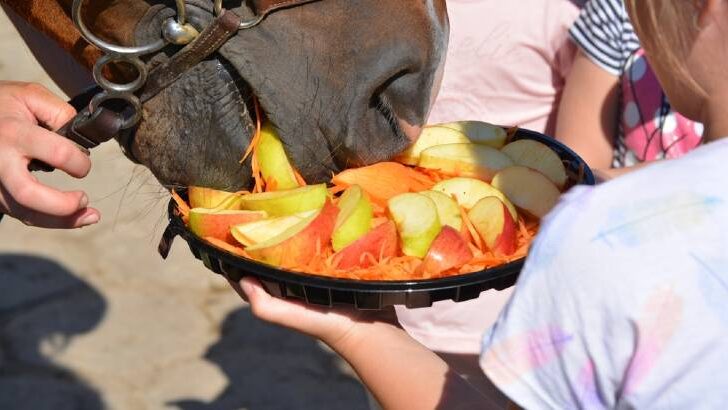Affiliate Disclaimer
As an Amazon Associate I earn from qualifying purchases. It helps me keep the website going. Thank you for your support.
We all know our horses love to roll, but why do they do it? In fact, anyone who watches horses roll in the dirt will be aware it’s about to happen. Circling and pawing at the ground, and dropping their nose are all signs of this frequent horse behaviour.
There are several reasons why horses roll, so it’s important to understand the triggers for this particular behaviour. Possible causes range from natural grooming patterns to pain, and discomfort; knowing the difference allows us to keep our horses healthy and happy.
So, it’s important to understand why horses roll. This will allow us to gauge whether they are just enjoying themselves or whether there is an issue that needs to be addressed.
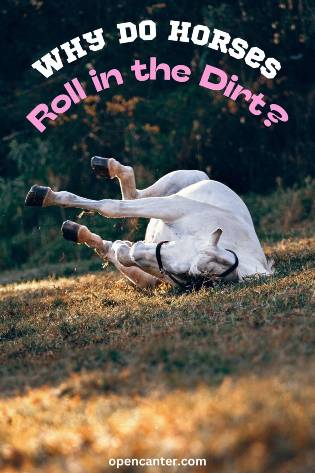
What Does it Mean When Horses Roll?
Below, we take a closer look at the different reasons for rolling.
Communication
Rolling is used to display dominance in a herd, usually, there’s a favourite spot and the leader always goes last. This is to ensure their scent lasts the longest amount of time. Rolling in this way can also communicate essential information to the herd, such as age and gender.
Horses also roll when they see others doing it, in a similar way to when humans yawn. If the dominant horse finds a favourite spot, other herd members often follow. The tell-tale patches in the field can tell us when this is happening!
Grooming
Rolling is an easy way for the horse to deal with itching from sweat, mud and insect bites. If your horse is doing this excessively, check whether you need to alleviate the cause of itching.
Rolling after a bath, while often irritating for the human, is a natural grooming response. In this way, the coat is dried, air is increased into the hair and the skin is warmed.
Temperature Regulation
Horses will roll during Spring to help remove their winter coat and cool down. In Winter, rolling can help condition their coat and dry off from the rain.
Horses’ hair is designed to stand up, rolling and then shaking off encourages this. If your rugged horse is rolling excessively in the winter, he may be too hot and just trying to adjust his temperature.
Relieving Tension and Stress
After working or riding your horse, he may want to roll to ease stiff sore muscles. Try to make sure you allow adequate cool-down periods following exercise (a good rule of thumb is to walk them for the same amount of time as the warm-up). This stretches the muscles out gently and allows any Lactic acid build-up to reduce.
Worrying Causes of Horses Rolling in the Dirt
In general, a healthy horse that rolls, will get up and continue grazing or other activity. Sometimes you’ll see them pawing at the ground first in an attempt to soften the earth before they roll.
This also allows them to check the depth of the dirt to make sure it’s safe to roll. If they’re rolling repeatedly, and showing signs of discomfort or stress, such as sweating and pacing, you need to act.
Poor-Fitting Tack
If your horse is rolling every time after working, they might be experiencing discomfort from the saddle. It’s always worth taking advice from your saddler and making sure the measurements are correct. If tack is fitting well, you may want to consider other reasons such as soreness and injury.
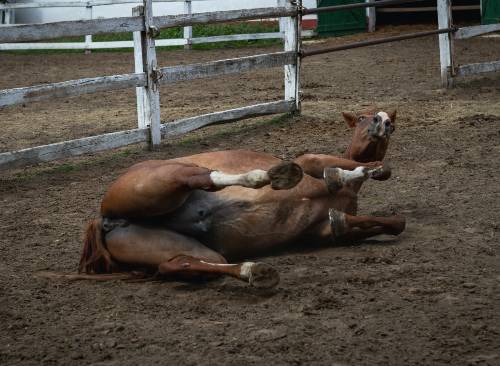
Pain
Horses may roll sporadically or frantically due to pain, or in an attempt to move intestinal contents and gas. Often the horse with colic will drop to the ground suddenly, and not shake themselves off afterwards.
Other signs your horse may have colic are general restlessness, looking at their flanks, sweating, or a heave line around their flanks.
A horse showing this behaviour should always be checked over by your vet promptly, and the horse made as safe as it can be, especially if in a confined space.
There are other types of pain that may cause rolling too. Stomach ulcers and spinal misalignment (spinal subluxation) may also be worth considering for repeated unexplained rolling.
If you think your horse is rolling because they are ill, and you want to get them up try this:
- Place a headcollar on them.
- Rock them gently by pushing from the front at the withers. Sometimes having an extra person lift their tail at the same time can also encourage them up.
- Pull back away from them as they rise in case they thrash about.
- Walk them slowly until the vet arrives.
When Horses Roll in the Dirt During a Ride
It can be very frightening when out riding if your horse suddenly drops underneath you and starts rolling. While some horses may have learnt this as a great way to avoid work, it’s such a dangerous prospect for any rider that understanding the cause quickly is essential for both horse and rider well-being.
Tack (again)
A thorough check of tack is required to make sure it’s comfortable for the horse. If rolling while tacked up has happened before, the saddle may be damaged and out of alignment – check with your saddler if unsure.
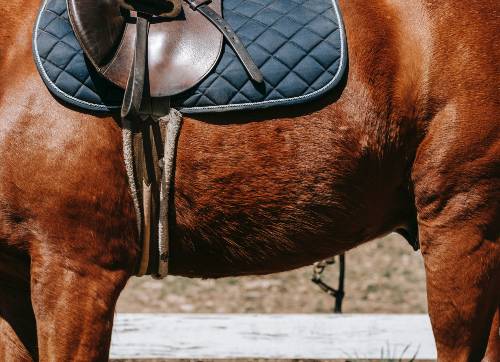
Pain
As with any rolling, pain should be ruled out. Stomach ulcers can be painful enough on their own, but the additional pressure from the girth can make it even worse.
If rolling when riding is happening more than once, it can be useful to keep a record. Try to note down when the horse is rolling with you mounted and what activity you are doing. Record this every time it happens, and check with your vet for medical causes.
If there are no medical or tack issues, you may want to take a closer look at behavioural training.
What to do if This Happens?
If you have some warning before he rolls, try lifting the bit up inside one corner of his mouth and applying pressure with your legs to move forward. Hopefully, this will keep him on his feet long enough for you to dismount safely and assess the situation.
Final Thoughts
Remember, horses rolling in the dirt is a completely natural behaviour, and they love to do it! Horses have some peculiar behaviours. Although it’s good to know the difference between healthy and more worrying rolling, remember to enjoy your time with your horse as well. He’s likely just happy and doing his thing!

